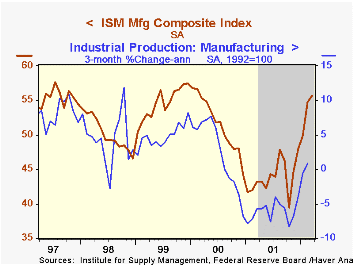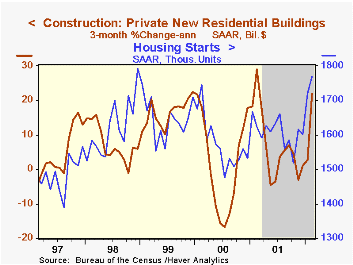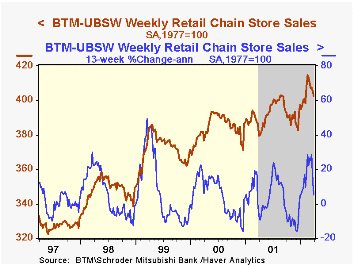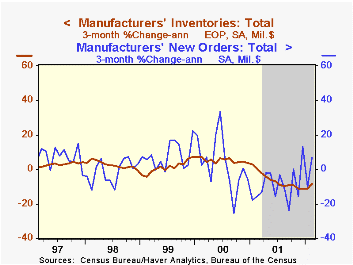 Global| Apr 01 2002
Global| Apr 01 2002ISM Index Slightly Higher
by:Tom Moeller
|in:Economy in Brief
Summary
The ISM Composite Index of manufacturing sector activity rose unexpectedly last month. Consensus expectations were for a slight decline to 54.5.The rise was in line with the moderate gain in the Chicago Purchasing agents' index. New [...]

The ISM Composite Index of manufacturing sector activity rose unexpectedly last month. Consensus expectations were for a slight decline to 54.5.The rise was in line with the moderate gain in the Chicago Purchasing agents' index.
New orders were quite strong rising to the highest level since 1987. The employment, supplier delivery and inventory components also rose but production fell.
Inflation pressure rose sharply, the index moving above 50 for the first time since February 2001.
Over the last twenty years there has been a 75% correlation between the ISM Composite Index and 3-month growth in factory production.
| ISM Manufacturing Survey | Mar | Feb | Y/Y | 2001 | 2000 | 1999 |
|---|---|---|---|---|---|---|
| Composite Index | 55.6 | 54.7 | 43.2 | 43.9 | 51.6 | 54.6 |
| Prices Paid Index | 51.9 | 41.5 | 49.9 | 43.0 | 64.8 | 54.2 |
by Tom Moeller April 1, 2002

The value of construction put in place rose slightly more than expected in February driven by sharply higher residential construction.
The January increase was revised lower due to lowered figures for nonresidential building, initially reported up, but residential building was revised higher.
Residential building rose for the third month in a row, up 6.4% since June.
In the nonresidential sector, sharp declines were registered across the board
Spending by governments fell for the first time since September, but public industrial and education construction were strong.
| Construction Put-in-place | Feb | Jan | Y/Y | 2001 | 2000 | 1999 |
|---|---|---|---|---|---|---|
| Total | 1.1% | 0.8% | 1.2% | 5.5% | 7.0% | 8.6% |
| Residential | 3.5% | 0.9% | 4.5% | 5.4% | 7.4% | 11.1% |
| Nonresidential | -3.0% | -1.7% | -17.4% | -0.3% | 8.0% | 1.9% |
| Public | -0.5% | 5.5% | 16.7% | 11.0% | 4.5% | 10.1% |
by Tom Moeller April 2, 2002

Chain store sales fell sharply last week, by the same 0.6% as during the prior week.
March sales were down 0.4% from the February average. February sales rose 2.5% from January.
During the last ten years there has been a 20% correlation between the monthly percent change in chain store sales and the change in consumer confidence.
| BTM-UBSW (SA, 1977=100) | 3/30/02 | 3/23/02 | Y/Y | 2001 | 2000 | 1999 |
|---|---|---|---|---|---|---|
| Total Weekly Retail Chain Store Sales | 402.5 | 405.1 | 6.0% | 2.1% | 3.4% | 6.7% |
by Tom Moeller April 2, 2002

Manufacturing inventories fell more than expected in February. January's decline, which originally showed moderation versus prior months, was revised deeper.
Inventory decumulation continued strong across industries. A slight rise in heavy duty trucks as well as aircraft caused the increase in the transportation industry.
Shipments fell 2.8% reversing all of the gains of the prior two months.
Durable goods orders were revised up slightly versus the advance report, to a 1.8% gain.
| Inventories | Feb | Jan | Y/Y | 2001 | 2000 | 1999 |
|---|---|---|---|---|---|---|
| Mfg Inventories | -0.4% | -0.8% | -8.8% | -7.5% | 4.6% | 2.3% |
Tom Moeller
AuthorMore in Author Profile »Prior to joining Haver Analytics in 2000, Mr. Moeller worked as the Economist at Chancellor Capital Management from 1985 to 1999. There, he developed comprehensive economic forecasts and interpreted economic data for equity and fixed income portfolio managers. Also at Chancellor, Mr. Moeller worked as an equity analyst and was responsible for researching and rating companies in the economically sensitive automobile and housing industries for investment in Chancellor’s equity portfolio. Prior to joining Chancellor, Mr. Moeller was an Economist at Citibank from 1979 to 1984. He also analyzed pricing behavior in the metals industry for the Council on Wage and Price Stability in Washington, D.C. In 1999, Mr. Moeller received the award for most accurate forecast from the Forecasters' Club of New York. From 1990 to 1992 he was President of the New York Association for Business Economists. Mr. Moeller earned an M.B.A. in Finance from Fordham University, where he graduated in 1987. He holds a Bachelor of Arts in Economics from George Washington University.
More Economy in Brief
 Global| Feb 05 2026
Global| Feb 05 2026Charts of the Week: Balanced Policy, Resilient Data and AI Narratives
by:Andrew Cates






